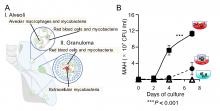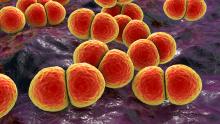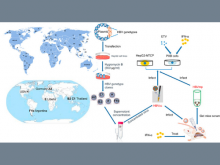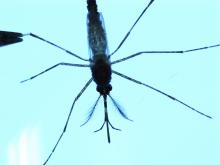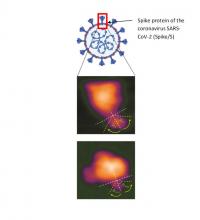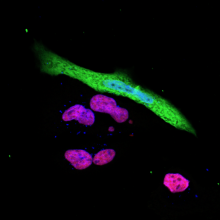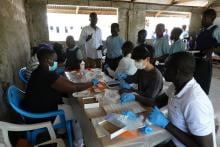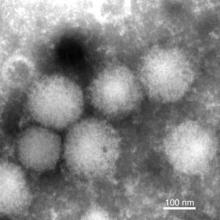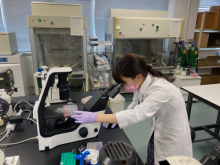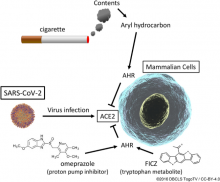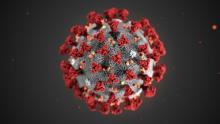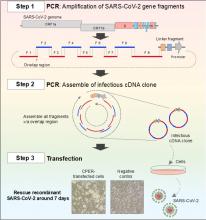Medicine & Healthcare Infectious disease
News
11 Jun 2022
Duke-NUS is working with the Bill and Melinda Gates Foundation to develop the Asia Pathogen Genomics Initiative (APGI) to improve regional genomic surveillance and sequencing capacity. New Centre for Outbreak Preparedness will support APGI and work closely with national and global partners to enhance regional capacity to predict, prepare and respond to future health threats.
21 Apr 2022
Genome profiling of Staphylococcus argenteus strains unveiled cross-contamination among Japanese retail foods and slaughterhouses.
14 Apr 2022
Bacteria hitchhike on red blood cells, New model simulates effects of exercise on muscles, Argon found in air of ancient atmosphere and Revealing emergent elastic fields of chiral crystals. Read all in the April Editor's Choice and this month's Asia Research News 2022 magazine pick - Asia's race to outsmart antimicrobial resistance.
29 Mar 2022
Mycobacteria are a group of pathogenic bacteria that cause diseases like leprosy and tuberculosis in humans. Now, a new study by scientists at Hiroshima University finds that mycobacteria are associated with red blood cells at lung infection sites, an interaction that has escaped scientific notice for 140 years since the discovery of the organism causing tuberculosis.
16 Mar 2022
Microgravity worms help solve astronaut muscle problems, CO2 recycling and drug development, Remote control of robot hand, Enabling the study of diverse Hepatitis B. Read all in the March's Editor's Choice and even more in the Asia Research News 2022 magazine.
04 Mar 2022
The Asian Development Bank partnered with global institutions to examine efforts to curb one of humanity’s most significant global health threats.
03 Mar 2022
Asia Research News surveyed institutions in Asia to learn about their latest contributions to antimicrobial resistance research.
14 Feb 2022
Advancement in cell lines capable of producing Hepatitis B’s many genotypes can reveal much about the unique virological features and treatment responses eluding researchers of this virus that has been infecting humans as far back as the Bronze Age.
11 Feb 2022
Low volcanic temperature ushered in global cooling and thriving dinosaurs, Broccoli compound induces cell death in yeast, A single molecule makes big splash in quantum mechanics, Dengue virus makes mosquitos bite more often, and Asia Research News: How it all began, all in the February's Editor's Choice

21 Jan 2022
A booster dose of the Pfizer–BioNTech vaccine (BNT162b2) against SARS-CoV-2 after an initial two doses of either the CoronaVac inactivated virus vaccine or Pfizer–BioNTech mRNA vaccine is shown to provide protection against the Omicron variant, in a pair of papers published in Nature Medicine.
13 Jan 2022
The dengue virus alters mosquito behaviour in a way that makes it three times more efficient at transmitting infection.
10 Jan 2022
Unveiling substructures at the edge of the Galaxy, Nanodiamonds key to efficient hydrogen purification, How SARS-CoV-2 evades our immune system, A Zika hijacking with devastating impacts & Finding the right story for your audience, all in the January Editor's Choice.
15 Dec 2021
In a recent study published in the Journal of Extracellular Vesicles researchers from Kanazawa University have visualized structural changes on the surface of SARS-CoV-2 that enable it to enter human cells.
09 Dec 2021
Micro-plastics cross blood brain barrier, Stomach cancer atlas, Omicron variant isolated, 120-year-old reaction turned on its head and Reporting through the coup, all in the December Editor's Choice. Plus our latest podcast: Decentralization and Democracy in Myanmar.
07 Dec 2021
Scientists at Hokkaido University and Texas A&M University have identified a key mechanism used by the SARS-CoV-2 virus to evade host immune systems.
30 Nov 2021
Researchers at the Department of Microbiology at The University of Hong Kong have succeeded in the isolation of SARS-CoV-2 Omicron variant from clinical specimens. This is the first known research team in Asia that has succeeded in isolating the Omicron variant. The isolated variant will enable the development and production of vaccines against Omicron, which has been designated as a "variant of concern" by the World Health Organization.
24 Nov 2021
Researchers from the Osaka City University Graduate School of Medicine have shown in patients with early-stage hepatocellular carcinoma who received cancer treatment that eliminating the hepatitis C virus with a direct-acting antiviral treatment reduces the risk of the liver cancer progression and increases overall patient survival.
16 Nov 2021
Scientists are turning to genomics to better understand the epidemiology of malaria and to inform control and elimination interventions and strategies. In the Lake Victoria region of Kenya, malaria burden remains very high despite more than a decade of intense control activities. A team of researchers from Osaka City University, Nagasaki University, London School of Hygiene and Tropical Medicine, and Mount Kenya University generated whole Plasmodium falciparum genome sequences from the lake region. Their analyses revealed that malaria parasites from this region appear distinct from other parasites from East Africa, while frequencies of known drug resistance markers were similar to those in other East African parasite populations. Their findings will help to develop improved surveillance tools to determine parasite transmission routes and aid clinical disease management.
04 Oct 2021
A previously unknown virus that can infect humans and cause disease has been identified by scientists in Japan. The novel infectious virus, named Yezo virus and transmitted by tick bites, causes a disease characterized by fever and a reduction in blood platelets and leucocytes.
01 Oct 2021
Paris, 29 September — UNESCO and the L'Oréal Foundation are unveiling the winners of this year’s International Prize for Women in Science, which honours five eminent women scientists with exceptional careers from the five regions of the world, as it has done annually since 1998.
29 Sep 2021
Geneva, 28 September 2021 – The Stop TB Partnership today released new data showing how the COVID-19 pandemic and dismally low levels of funding represent the main barriers to achieving the United Nations Sustainable Development Goals of ending TB by 2030.
24 Sep 2021
Scientists created “elite” antibodies that can beat a broad range of coronavirus strains, including Delta, using a new technique that dramatically speeds up discovering potent antibody candidates.
10 Sep 2021
Researchers have identified a potential reason why lower numbers of COVID cases have appeared amongst smokers compared to non-smokers, even as other reports suggest smoking increases severity of the disease.
02 Sep 2021
A rapid way to track an elusive part of the immune system will bring better vaccine strategies
19 Aug 2021
The finding could underpin a “dream” vaccine that covers not only SARS-CoV-2 and its known variants of concern (VOCs), but also future VOCs and other animal coronaviruses with known potential to cause severe disease in humans
15 Jul 2021
Scientists have developed a rapid, highly accurate test to detect antibodies against the spike protein of SARS-CoV-2 in human serum, opening a new avenue for understanding the full extent of the pandemic and evaluating the effectiveness of vaccines.
19 May 2021
Scientists from Hokkaido University have shown that an antigen-based test for quantifying SARS-CoV-2 in saliva samples is simple, rapid, and more conducive for mass-screening.
13 May 2021
A simple tool allows researchers to track how different subpopulations of the Plasmodium knowlesi parasite are changing over time.
13 Apr 2021
Researchers from Osaka University and Hokkaido University develop a system for analyzing mutations in SARS-CoV-2 that is much simpler and faster than existing methods.
24 Mar 2021
Study shows that antibody longevity varies widely from 40 days to as long as several decades and not everyone who has recovered from COVID-19 is immune from reinfection. Individuals with low levels of neutralising antibodies may still be protected if they have robust T-cell immunity. Blood tests and a computer algorithm suggest annual vaccinations might be needed for some individuals to prevent future outbreaks of COVID-19.
Events
Sorry, nothing coming up for this discipline
Researchers
Sorry, nothing coming up for this discipline
Giants in history
Sorry, nothing coming up for this discipline





